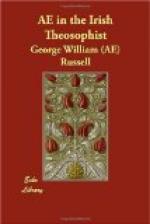The air was cool with the coming of winter; but with the outer cold came the inner warmth of the sun, full of subtile vitality and strength. And the Ultonians had assembled to light the yearly fire in honor of the Sun-God, at the seven-days’ feast of Samhain. There the warriors of Ulster rested by the sacred fire, gazing with closed eyes upon the changing colors of the sun-breath, catching glimpses of visions, or anon performing feats of magic when they felt the power stirring within their breasts. They sang the songs of old times, of the lands of the West, where their forefathers live ere the earth-fires slew those lands, and the sea-waves buried them, leaving only the Eri, the isle where dwelt men so holy that the earth-fires dared not to assail it, and the ocean stood at bay. Lightly the warriors juggled with their great weapons of glittering bronze; and each told of his deeds in battle and in the chase; but woe to him who boasted or spoke falsely, magnifying his prowess, for then would his sword angrily turn of itself in its scabbard, convicting him of untruth.
Cuchullain, youngest but mightiest of all the warriors, sat moodily apart, his beardless chin resting in the palms of his hands, his eyes staring fixedly at the mirror-like surface of the lake upon whose sloping bank he rested. Laeg, his charioteer, lying at full length upon the greensward near by, watched him intently, a gloomy shadow darkening his unusually cheerful face.
“It’s a woman’s trick, that,” he muttered to himself, “staring into the water when trying to see the country of the Sidhe, and unworthy of a warrior. And to think of him doing it, who used to have the clearest sight, and had more power for wonder-working than anyone else in the lands of the West! Besides, he isn’t seeing anything now, for all the help of the water. When last I went to the dun some women of the Sidhe told me they had looked up Cuchullain and found he was getting too dim-eyed to see anything clearly now, even in his sleep. Its true enough, but to hear it said even by women!”
And the discontented charioteer glanced back contemptuously at a group of women a short distance away, who were following with their eyes a flock of wild birds circling over the plain.
“I suppose they want those birds,” he continued, conversing familiarly with himself. “Its the way of women to want everything they see, especially if its something hard to catch, like those wild birds.”
But Laeg’s cynicism was not so deep as to keep his glance from lingering upon the bevy of graceful maidens and stately matrons. Their soft laughter reached his ear through the still evening air; and watching their animated gestures he idly speculated upon the plane he felt sure they were arranging.
“Yes; they want the birds. They wish to fasten the wings to their shoulders, to make themselves look like the women of the Sidhe. They know Cuchullain is the only man who can get the birds for them, but even Emer, his wife, is afraid to ask him. Of course they will coax that patient Ethne to do it. If she succeeds, she’ll get no thanks; and if she fails, she’ll have all the blame, and go off by herself to cry over the harsh words spoken by Cuchullain in his bad temper. That’s the way of Ethne, poor girl.”




